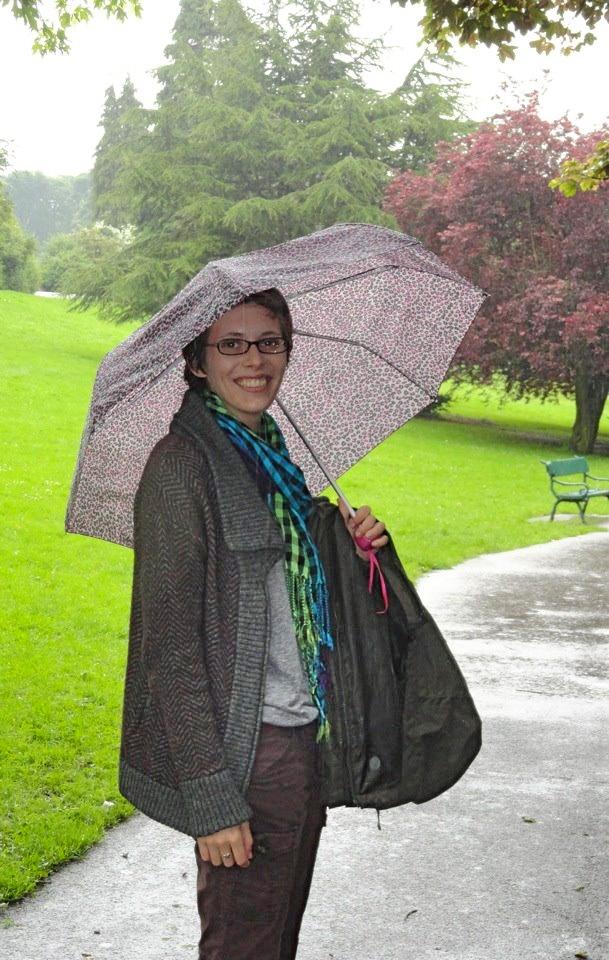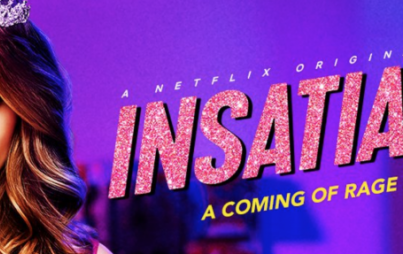
Corinne Tandy is on the frontlines of fear these days. Psychologically, that is. As Ebola continues to ravage West Africa, and creeping cases of the disease have permeated our nation's not-so-impenetrable borders, American blood has been running high. The media has been propagating a morbid fantasy of our own pending demise, while governmental authorities have been lauded and lambasted for subjecting our own citizens—namely Kaci Hickox—to controversial quarantines under the auspices of protecting our people.
As a third year PhD candidate at the University of Tennessee studying Comparative Medicine with a focus on Epidemiology (infectious disease), Tandy—who happens to be this writer's cousin—believes this outbreak of Ebola has surfaced some fascinating, and troubling, societal stances on the notion of "an outbreak."
But mostly? She thinks everybody just needs to calm down and get their facts straight.
How did you become interested in putting a narrative to death and the disease of the human body?
Honestly, I've been interested in criminology since I was in adolescence. I was reading Jack the Ripper true crime books as a 13-year-old . . . which always really impressed my mother. [laughs] I've always liked investigation and puzzles. I started taking criminology courses in high school as well as human anatomy and physiology courses as an elective, and that's what got me really interested in the human body.
While in high school we read this book by Dr. Bass called Death's Acre, which discusses the establishment of the "body farm" or what's officially known as The Anthropological Research Facility [where we dissect and study cadavers]. He talks about the necessity of setting it up, the early cases he worked on and his use of decomposition research. My teacher was really into it. I began to really love how human body parts fit together so well. It's incredible and felt like this giant puzzle. We're extraordinary hearty and difficult to rip apart; how it all stays together while just walking down the street is pretty amazing.
So then I started thinking about anatomy and medicine and getting into disease processes—what could disrupt this great system? It offered an investigative perspective with the forensic application.

Well, in undergrad I studied anthropology with a concentration in physical anthropology and forensics, and when I finished there I thought about going into medicine . . . but truthfully, I'm kind of anti-social so I thought that might not work because I would have to go to clinics and work with live people. [laughs]
But with forensics I work with dead people, which was preferable. It's really incredible to look at a skeleton, see a gunshot wound and be able to tell it was likely homicide or suicide. Or find someone in the woods, have no idea who they are, and by looking at their skeleton, establish who they are and what put them in the woods to begin with. If something terrible happened to them you can figure out who did that and then inform the families. There is a higher level societal contribution this field makes.
I mean no one can deny that forensic anthropologists are fighting the good fight in bringing what is often a sordid truth to light, from working with the police force to genocide victims . . . but do you ever wonder about your own ability not to let violence and death affect you? I mean, the idea of just seeing a dead body is often too much for people to handle . . . much less stripping it of its flesh or studying its decomposition.
My mother has been concerned about this, and I have been concerned about this in the past. How easy it's always been for me to walk into the medical examiner's office. We don't always deal with skeletons—sometimes we have to, like you said, take the skeleton out of the cadaver, removing all the soft tissue. The first autopsy I ever worked on was a three-day-old infant. And yes. There's an extreme disconnect. There's something about the environment —I don't know if it's personal or a contextual necessity, but you definitely disconnect.
But that's why I like the dead people better then the sick and bleeding . . . those people are suffering. And they would say to me, "Help!" And that makes me unable to cope. The idea of that makes me insane. The people in the morgue however—we're trying to find out what's happened. There's no suffering. Whatever they've been through is over. Our analysis will be handed over to the legal system and the emotions are someone else's problem. Honestly, it's a taboo subject to talk about within the field. You can't ask another forensic scientist, "So do you ever feel like a sociopath?"
Because I do . . . but I also don't. It's the PC thing to do to feign, "Oh! This is terrible!" but honestly, you may not feel that way at all. It's work and it's important work. I want to make sure that I feel confident in my results. "This individual is a white female between 20-40 and sustained this type of trauma and fracture." I want this person to be identified and I want there to be a successful legal case, so whoever did this to her will be brought through the justice system.
Have you ever had the satisfaction of knowing your findings were responsible in putting somebody away?
It's interesting. One of the ethical considerations in the field if there is a high-profile case and there's a suspect in custody is . . . should we know about that? It's like having jurors watching the coverage of the case they're supposed to be weighing in on. It's similar with forensics. It's better to do your analysis and send it off.

How do you decide what to subject the body to?
It's always about running a particular experiment that's research-focused and that determines the conditions. They might say, "OK, we want to find out how fast someone decomposes in the sunlight." So someone goes out and records that vs. in the shade. vs. outside vs. in a closed car trunk. While I worked there we studied two hangings, how the decomposition patterns shift, the way the bones spread once they're decomposed.
How long does it take a whole body to "become a skeleton?"
I mean, in a Tennessee summer it's 95 degrees. You'll be a skeleton in a week. It's all heat and maggots.
So how did all this inform your decision to shift away from forensics and focus instead on infectious disease?
Like I said, I've always been interested in medicine—it's really a big "whodunnit." People have symptoms, but what's causing this? Why is this happening? Just think about a fever. You can get one when you're stressed out or when you have a blood infection and you're going to be dead in a week—it can be caused by nearly everything. How do you interpret this suite of symptoms and identify the right cause of illness?
There's something bizarrely lovely about seeing the anatomical structures, normal variations of the human body and then seeing how they go wrong. We learn so much about normal function by learning about abnormal function. In order for everything to work properly it has to not do this.
So as someone on the frontlines of infectious disease, what do you have to say about this recent outbreak of Ebola, it's management and what's (in my layman understanding) the fear-mongering and rampant misinformation surrounding it?
So. First I'll talk about the disease. I read this book a while ago by Richard Press (who I'm sure is enjoying the resurgence of book sales) called The Hot Zone, which was all about Ebola.
When I say things like, "Wow, that's fun" in regards to infectious disease my mother looks at me, like, please stop. But of course what I really mean is it's interesting, it's extraordinary! There's really something unbelievable about Ebola. This little virus is such a simple thing and it just blasts through and annihilates 90% of the people it gets into. And this book was written before this outbreak. It used to be 50 people at a time in the Congo, but then no one cared, because it was a bunch of people in Zaire so "who gives a shit," right?
This virus form the heart of darkness, every now and then, historically, would crop up, wipe out 200 people and then burn out and go away for two decades. It's actually really typical for emerging pathogens to cause these short outbreaks, especially in a disease that's so deadly, it's more likely to have a quick burnout than for a sustained epidemic because it kills its host too fast to pass it along. It's part of the natural selection; the virus isn't "good" enough to stick around forever.
HIV however (for example) is an incredible virus because it does exactly the opposite. You don't know you're sick for a really long time, but you're infectious. It can get from host to host to host to host and spread through entire nations before anyone notices, because the symptoms happen so much later.
Hot Zone addresses the concept—what if a strain of Ebola mutates into something less pathogenic and therefore more successful? What if it calms down a little bit and takes two weeks instead of three days to kill its host?
This current outbreak isn't a new strain, but because of travel differences between say now and the 1960s, we can get from one place to another while sick before we die so we can pass it to more people. The virus—I don't think—is more successful, but it doesn't have to because we're doing that for it.

OK. So I feel like I'm about to kick a hornet's nest here, but what is the worst element of the reporting surrounding Ebola?
God, it makes fucking insane. America has lost its complete mind. The reporting is terrible. Honestly, I can't even watch the news about it, because it fills me with rage and I have better things to do than be mad at the television.
In addition to offering outright incorrect information in their initial coverage, the media did not do a sufficient job of making how one contracts the disease clear. You have to come into contact with a human that has Ebola or with the bodily fluids of a human with Ebola. It is not airborne. It's not the flu. When they say that coughing is a symptom, people suddenly think, "That means I can get it from a cough!"
And of course there are the conspiracy theorists who think that, you know, the CDC is part of the government and they're lying to us. But even those people who aren't into conspiracies don't know where to go for reliable information—the Internet is full of incorrect information and garbage. News organizations weren't very good at saying, "To learn more, go to CDC.gov."
And honestly, why would the public at large know anything about Ebola? People don't know anything about all kinds of diseases and they get along just fine. The media taking advantage of that ignorance to make a news piece that's sensational is irresponsible and scary. The disease is terrifying . . . if you're going to get it, but geez, but it's kind of hard to.

It's a mess with politics getting involved in this. The CDC put together completely conservative—but effective—recommendations for anybody coming in from any of these countries affected by Ebola. But individual states have the right to make their own protocol—the CDC is just a "federal recommendation." So New York and New Jersey decide that everyone coming in goes to immediate quarantine.
So Hickox arrives and it's like, "Ma'am please step over here." They basically imprisoned her—she wasn't allowed access to basic provisions we provide rapists and murderers in prison! And she was asymptomatic. She had a fever, but her temperature was also taken fours hours after she was involuntary quarantined—of course she had a fever.
She was only allowed to talk to her lawyer on the telephone, but she was allowed to see doctors. If these people are allowed to talk to her in person, why can't her lawyer? The whole thing became about politics—with respective authorities in NY and NJ saying, "Oohh look at us! We're helping to keep Ebola out of the U.S."—and that kind of political maneuvering is grotesque.
The poor woman was held against her will for no reason. The idea of imprisoning someone who had been doing voluntary aid for this outbreak in West Africa is just maddening. Why punish them? They're doing something that no one wants to do. And this kind of reaction and behavior discourages further personnel from going, and that's the only way this thing is going to stop. With the resources to assist. West African countries don't have the resources to combat it; otherwise it wouldn't have been a problem to begin with. So why the hell would someone head over there knowing that when they get back home, they're going to be locked up in a some room . . . unless they're feeling extraordinarily altruistic.
Then again, the CDC had the opportunity to say, "Hey NJ, what are you doing?!" But they didn't. Though I'm not sure it's their place; after all, they had already made their recommendations.
Anyway, it's been a total shit show.
Do you think America being totally unprepared for this kind of situation and lacking any formal protocol is a strange form of arrogance? Like nothing can happen to us, this is the first world people! This is the freaking United States of America!
I don't know if it's arrogance; we just think we don't need to be afraid. So we get complacent. It's like modern medicine has done too good a job. Maybe it's easier to explain with the vaccine analogy. Polio was a gigantic problem. And there were mass vaccinations. Half a century later, no one is afraid of getting polio. We don't live in fear of our children waking up one morning not being able to move their legs. We're not afraid because it hasn't happened in so long, we don't remember what it's like to be afraid. So then we start saying we don't need to get vaccinated. Well, once everyone says that, then no one is vaccinated and it's a problem again.
With things like Ebola and pandemic problems, influenza, avian and swine flu, SARS—we go fuck, is this going to be like 1918 when we lost a gigantic percentage of our population . . . to the flu of all things? Everyone panics. We have a system that protects us from these third world problems; we have this barrier of infrastructure that keeps these things out. But when we realize there's a hole, we have a nervous breakdown. It's like we've never dealt with it before because everyone who has is dead because it hasn't happened since 1918.
People don't make living wills because mothers don't die in childbirth and babies don't die. Because it's not the Congo. This mentality—it stretches through every perception of medicine, from our public health perspectives to our personal ones. We think, "This can't happen to me."
But we'd be better off paying attention to places other than the western world. We're so focused on me and not us as a collective, and how we function within society at large. We live and thrive in micro-societies and that has a lot to do with this attitude.
I've gotta ask. How do you fare being a women in this field?
You know I've watched my mother struggle in academia for years [she's an English professor] and some would say, "It's the devil you know!" But I feel like, yeah, that's that devil I know and don't feel like continuing. I think I'll go over here and meet a different one. Honestly that was a big game changer for me to choose infectious diseases. I need a job where I practice. I do practical work. Academics teach but what I loved was the casework. So I'm hoping to work at the CDC, a state health department, apply to the Epidemic Intelligent Service.
What are you up to when you're not examining skeletons?
I don't have any hobbies. [laughs] My free time consists of watching bad television . . . or collecting spoons, like that's real. So as a desperate attempt to have a hobby, instead of saying, "TV and reading!" like everyone else on the planet, I decided to learn how to play the violin. I love it. I started doing it in August. Poor Jason [my boyfriend]. My poor cat. But it's a great stress relief. This is the thing about academia. I just didn't have the time to dedicate to leisure activities. It's like, yeah, let's go to the Smoky Mountains! But it's hard to enjoy when in the back of your head you've got 15 articles to read and a proposal to write. So, something 9 to 5 sounds lovely.






